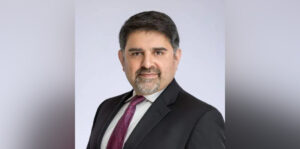ASTANA – The leaders of five Central Asian states, including Kazakh President Kassym-Jomart Tokayev, are slated to meet with United States President Joe Biden on Sept. 19 in the first-ever C5+1 presidential summit. The upcoming meeting has been long overdue, Kamran Bokhari, a senior director of the Eurasian Security and Prosperity portfolio at the New Lines Institute for Strategy and Policy, writes for the Wall Street Journal.

Bokhari has also served as the Central Asia Studies Course Coordinator at U.S. Department of State’s Foreign Service Institute. Photo credit: newlinesinstitute.org.
The meeting will take place on the sidelines of the United Nations General Assembly session.
Bokhari sees the upcoming meeting between Biden and Central Asian presidents as a “foreign-policy opportunity” at a time when Russia and China, the two countries that have had a bigger influence in the region, “face challenges,” including the war and China’s economic slowdown.
“The C5+1 meeting is long overdue and could be a crucial step in a vital region,” writes Bokhari, who is also a national security and foreign policy specialist at the University of Ottawa’s Professional Development Institute.
The C5+1 began in 2015 to enhance Central Asia – U.S. dialogue and cooperation.
Before the presidential summit, the dialogue platform advanced through engagement at the ministerial level, expert meetings, and thematic working groups. Since September 2021, the C5+1 has had four ministerial meetings, with the latest in February in Astana.
Bokhari emphasized the U.S. needs a strategic approach to the region, where the nation had less influence compared to that of Russia and China.
According to him, Washington has been lagging behind Moscow and Beijing in terms of regular meetings with Central Asian leaders. He mentions the Xi’an summit in May and the visit of Vladimir Putin to the Kazakh capital for a meeting in C5+1 format.
Bokhari describes Kazakhstan as a “natural leader” in the region, saying the U.S. needs to work closely with the country.
He mentioned the ongoing reforms in Kazakhstan, which he deemed “much needed,” and how the nation is strategically establishing itself as an emerging international player across various domains, such as nuclear nonproliferation, counterterrorism, conflict resolution, and international development.
“The country follows a multivector foreign-policy doctrine, meaning it aims to foster close relations with all major global players, including Russia, China, the U.S. and the European Union,” said the American expert.
He highlighted the important role Kazakhstan could play in the current geopolitical environment.
“Because of its proximity to Russia and China, Kazakhstan can help Washington seek a settlement in Ukraine and manage relations with Moscow in the uncertain postwar era, as well as deal with intensifying competition with Beijing,” he wrote.
One of the ways Kazakhstan can benefit from the U.S. increased engagement in the region is the development of the Trans-Caspian International Transport Corridor, known as the Middle Corridor, through “investments, trade, technology and global leadership.”
“This multichannel transportation artery connects the East and West via pipelines, railroads, highways and fiber-optic cables. The corridor will enhance the economic development of Central Asia and will contribute to international energy and other trade flows,” writes Bokhari.
Kazakhstan’s ambitions toward a more democratic model of governance can seek U.S. assistance, too, according to Bokhari. By doing so, Kazakhstan can serve as an example for its Central Asian counterparts.
President Tokayev arrived in New York on Sept. 17. He has met with business executives and is expected to address the General Debates of the UN General Assembly.


